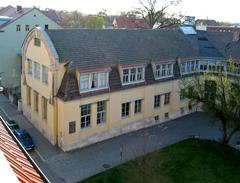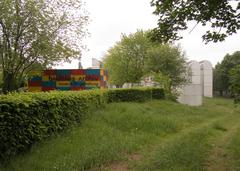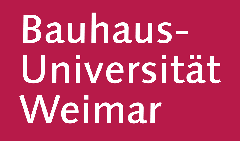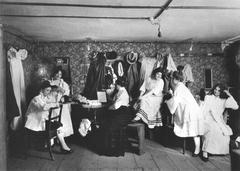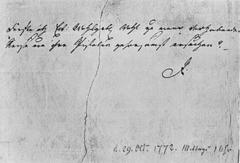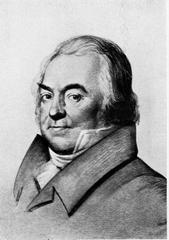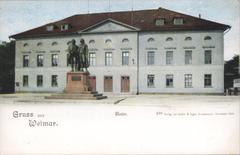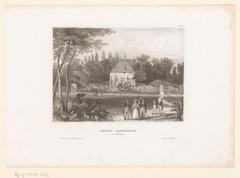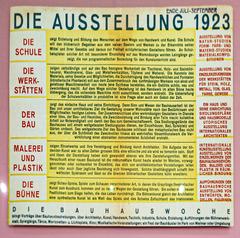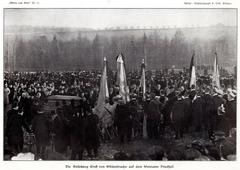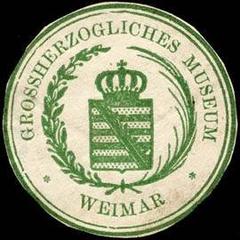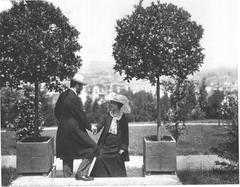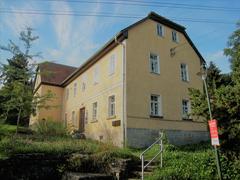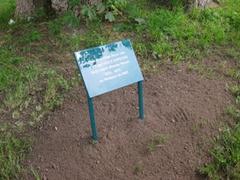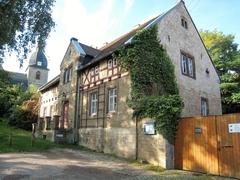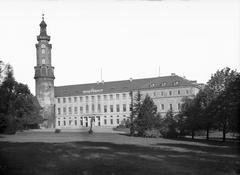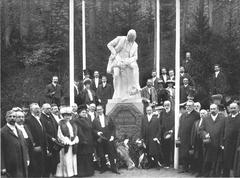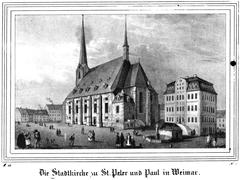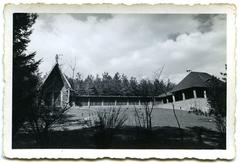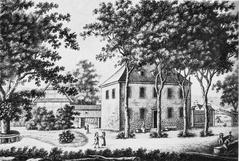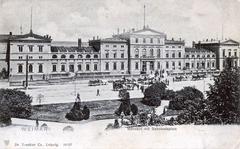
Stadtarchiv Weimar: Visiting Hours, Tickets, and Historical Site Guide
Date: 04/07/2025
Introduction: The Significance of Stadtarchiv Weimar
Nestled in the cultural heart of Weimar, Germany, the Stadtarchiv Weimar is a cornerstone institution dedicated to preserving the city’s multifaceted heritage. As the official municipal archive, it safeguards documents, photographs, maps, manuscripts, and memorabilia dating back to the 14th century. These collections vividly illustrate Weimar’s evolution from a medieval settlement to a center of art, politics, and social change—most notably, as the birthplace of the Weimar Republic and a beacon of German Classicism.
The archive’s roots reach the mid-13th century, with the earliest surviving document from 1307 and the first city scribe mentioned in 1326. Originally housed in the historic town hall (Rathaus) and known as the Ratsarchiv, professional archival management began after World War II. In 1998, the archive transitioned to a purpose-built facility at Kleine Teichgasse 6, designed to meet modern standards for preservation, accessibility, and public engagement (archive-in-thueringen.de; stadt.weimar.de).
Boasting a wide array of municipal records, printed newspapers, over 9,000 digitized photographs, and unique special collections, the Stadtarchiv Weimar is a vibrant research hub. It extends its reach through digital platforms, online catalogs, and thematic virtual exhibitions, inviting both local and global audiences to explore Weimar’s rich historical narrative (fotoarchiv.weimar.de; deutsche-digitale-bibliothek.de).
Visitors benefit from free admission, accessible facilities, and proximity to Weimar’s renowned landmarks such as the Goethe National Museum and the Bauhaus Museum. This comprehensive guide provides all the essential details for planning your visit: hours, tickets, accessibility, collections, digital resources, travel tips, and more (stadt.weimar.de; archive-in-thueringen.de).
History and Development
Origins and Evolution
The Stadtarchiv Weimar’s origins date to the elevation of “Wimaria” to city status in the mid-13th century. The earliest extant document is from 1307, and the city’s first scribe is recorded in 1326 (archive-in-thueringen.de). Initially, the archive was kept within the Rathaus as the “Ratsarchiv.” Professional management began in 1948, laying the groundwork for systematic cataloging and preservation. In 1998, the archive moved to its present, purpose-adapted building at Kleine Teichgasse 6.
Architectural Features
The current facility reflects a modern, functional design that harmonizes with Weimar’s historic cityscape. Large windows provide natural light, and the barrier-free entrance ensures accessibility. Inside, visitors find a welcoming reception, a spacious reading room, secure storage, and a multipurpose area for events and exhibitions. State-of-the-art climate control and security systems protect the archive’s invaluable holdings.
Collections and Holdings
Scope and Highlights
- Official Documents: City charters, council minutes, administrative files, and legal records from the 14th century onward.
- Printed Materials: Newspapers such as “Weimarische Wöchentliche Anzeigen” (since 1759), city directories, and statutes (weimar.de).
- Photographs and Visual Media: The Fotoarchiv Weimar offers digital access to over 9,000 historic images (1870–1995), plus maps, postcards, and posters.
- Personal and Institutional Collections: Estates, manuscripts, and memorabilia of prominent Weimar citizens.
- Special Holdings: Rare books, festival records, legal and notarial documents, and a dedicated reference library.
Digital Initiatives and Accessibility
Digitization and Online Resources
- Fotoarchiv Weimar: A searchable online database for photographs (Fotoarchiv Weimar).
- Deutsche Digitale Bibliothek: Selected holdings are accessible via this national portal (Deutsche Digitale Bibliothek).
- Digital Catalogs: Online finding aids with searchable metadata.
- Thematic Projects: Digital exhibitions and the Zeitsprung project, juxtaposing historical and contemporary images (Zeitsprung).
User Experience and Engagement
- Accessible Facilities: Barrier-free entrance, elevators, and accessible restrooms.
- Workstations: Computers and internet access in the reading room for digital research.
- Conservation Standards: High-resolution digitization and climate-controlled storage ensure document integrity (Klassik Stiftung Weimar – Digitisation).
Visiting Information
Hours
- Tuesday: 9:00–12:00 and 13:00–18:00
- Thursday: 9:00–12:00 and 13:00–16:00
- Friday: 9:00–12:00
- Closed: Weekends and public holidays
Advance appointments are recommended for research or access to specific materials.
Tickets and Admission
- General Entry: Free of charge
- ID Requirement: Valid photo ID may be needed for accessing certain collections
- Fees: May apply for reproduction or special research services
Accessibility
- Fully barrier-free, with ramps, wide corridors, and elevators
- Accessible restrooms
- Staff assistance available for visitors with special needs
Photography and Reproduction
- Permission required; inquire at the information desk
- Fees may apply for reproduction or publication
Guided Tours and Events
- No regular guided tours; special lectures, workshops, and exhibitions are offered in cooperation with the Stadtmuseum
- Check the events calendar for updates
Travel Tips and Nearby Attractions
Getting There
- Address: Kleine Teichgasse 6, 99423 Weimar
- Transport: Easily accessible by foot, bicycle, or public transport; bus stops nearby; parking at Weimarplatz
Nearby Cultural Sites
- Goethe National Museum
- Duchess Anna Amalia Library (UNESCO World Heritage)
- Bauhaus Museum
- Stadtmuseum Weimar
- Weimar City Palace
Combining your archive visit with these sites provides a comprehensive cultural experience.
Practical Visitor Tips
- Advance Registration: Recommended for research visits or group access
- Identification: Bring valid ID for document access
- Language: Most materials and staff communication are in German; limited English support available
- Time Allocation: Plan 1–2 hours for exploration; longer for research
- Rules: Only pencils, laptops, and notepads allowed in the reading room; follow all archival handling guidelines
Frequently Asked Questions (FAQ)
Q: What are the Stadtarchiv Weimar’s visiting hours?
A: Tuesday 9:00–12:00 & 13:00–18:00, Thursday 9:00–12:00 & 13:00–16:00, Friday 9:00–12:00; closed on weekends and public holidays.
Q: Do I need a ticket or pay admission?
A: No, entry is free. Fees only apply for reproductions or special services.
Q: Is the archive accessible for visitors with disabilities?
A: Yes, the facility is fully barrier-free.
Q: Are guided tours available?
A: Regular tours are not offered, but special events and exhibitions include workshops and lectures.
Q: Can I take photos inside?
A: Photography is restricted; ask staff for current policies.
Q: Are materials available in English?
A: Most materials are in German; some staff can assist in English.
Conclusion and Recommendations
The Stadtarchiv Weimar is an indispensable resource for anyone seeking to understand the city’s complex and illustrious past. Its collections illuminate every facet of Weimar’s development, from medieval times through the Classical and Bauhaus eras, to modern-day cultural life. With free entry, modern facilities, and strategic proximity to other major heritage sites, the archive is both a research haven and an essential stop for cultural tourism.
To maximize your visit:
- Check current opening hours and event schedules online.
- Register in advance for research or group visits.
- Combine with tours of nearby museums and UNESCO sites.
- Explore digital resources before and after your visit.
- Download the Audiala app for self-guided tours and cultural content.
Begin your exploration of Weimar’s living history at the Stadtarchiv Weimar—the gateway to centuries of culture, politics, and creativity (stadt.weimar.de; fotoarchiv.weimar.de).
References and External Links
- Stadtarchiv Weimar: Visiting Hours, Tickets, and Historical Highlights of Weimar’s City Archive, 2025 (stadt.weimar.de)
- Visiting the Stadtarchiv Weimar: Collections, Digital Initiatives, and Visitor Information, 2025 (fotoarchiv.weimar.de)
- Stadtarchiv Weimar Visiting Hours, Tickets, and Historical Significance, 2025 (archive-in-thueringen.de)
- Visiting Stadtarchiv Weimar: Hours, Tickets, and Guide to Weimar’s Historical Archive, 2025 (stadt.weimar.de)
- Deutsche Digitale Bibliothek, 2025 (deutsche-digitale-bibliothek.de)
- Klassik Stiftung Weimar – Digitisation, 2025 (klassik-stiftung.de)

